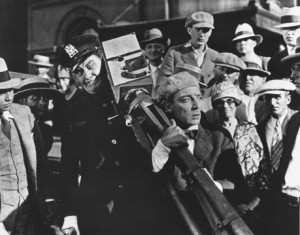 The Cameraman, a comedy made in 1928, stars Buster Keaton as a sad sack who shoots tintype portraits on a street corner for a living. By chance he falls for a young woman (played by Marceline Day) who works for a company that makes newsreels, so he buys a movie camera and tries to make it in the newsreel business so that he can impress her and win her heart.
The Cameraman, a comedy made in 1928, stars Buster Keaton as a sad sack who shoots tintype portraits on a street corner for a living. By chance he falls for a young woman (played by Marceline Day) who works for a company that makes newsreels, so he buys a movie camera and tries to make it in the newsreel business so that he can impress her and win her heart.
Now, some background on this film is that after the disappointing box office of Steamboat Bill, Jr., Keaton was persuaded by his brother-in-law Joe Schenck to give up his status as an independent producer and sign a deal with MGM, where Schenck’s brother Nick ruled the roost. This was his first film at Metro, and the studio tried to fit Keaton into their fixed ideas concerning script and production. Luckily, he insisted on doing things his way.
Although The Cameraman is generally less daring than Keaton’s other great comedies, there are some memorable set pieces. One involves Buster going to an indoor swimming pool with his girlfriend, and having to get undressed and into a swimsuit in a tiny dressing room already occupied by a quarrelsome fat man. (The entire hilarious scene was improvised.) But the film’s best sequence ranks as one of the classic all-time Keaton bits. Buster gets a tip that trouble is brewing in Chinatown. He goes there with his camera, gets stuck with an organ grinder’s monkey hanging on to him (it would take too long to explain) and then a “tong war” starts in the streets. The ensuing chaos, with Buster trying to film all the mayhem while being shot at and otherwise attacked by the participants, is a perfect example of how Keaton could come up with the most complicated stunts, flavor them with terrifically inventive variations, and dish it all out at a perfect pace—all the while maintaining the deadpan, fatalistic sense of humor that was his trademark.
Keaton made only one more picture after this, and then the sound era, studio politics, and his alcoholism and divorce spelled the end of his career as a director. It took another three decades for cinephiles to rediscover his genius and reward him with new acclaim while he was still living and able to appreciate it. I urge you now, if I haven’t already, to rent the DVDs or find some way to view not only The Cameraman, but anything and everything you can by Buster Keaton in the silent era, shorts and features, from 1917 to 1928. Rarely will you be disappointed.

